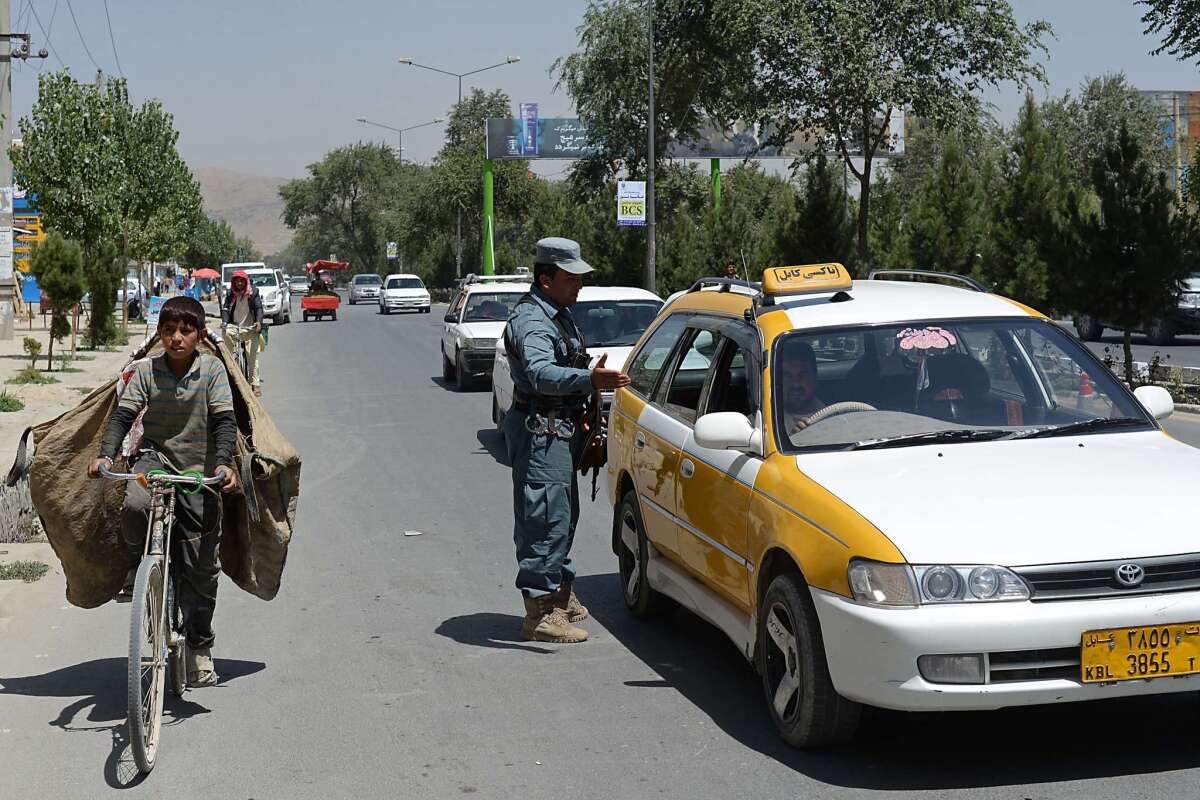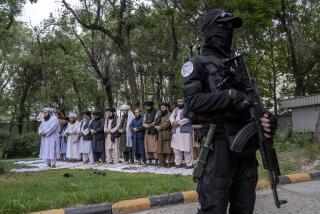International soldier dies after reported stabbing in Afghanistan

An international soldier in Afghanistan died of wounds suffered in an attack Wednesday, the U.S.-led military coalition said, hours after witnesses said a foreign national was stabbed in the neck in a Kabul marketplace.
It was not immediately clear if the soldier was the stabbing victim. Coalition officials said in a brief statement that a “service member died of wounds as a result of an attack in eastern Afghanistan,” and declined to elaborate.
Afghan police officials could not confirm the victim’s identity. A spokesman for the International Security Assistance Force, as the coalition is known, told the Los Angeles Times that more details would be available within 24 hours.
The stabbing occurred about 10 a.m. when unidentified men emerged from a car and attacked a man standing beside the road leading to Kabul’s international airport, which is also used by the military coalition, witnesses told Tolo News, an Afghan news network. The men stabbed the foreign national in the neck and fled the area, according to the report.
Also Wednesday, Afghanistan’s attorney general’s office ordered a New York Times journalist to leave the country and not return, accusing him of publishing an article that was a threat to “national unity.”
Authorities gave the journalist, Matthew Rosenberg, a three-year veteran of the newspaper’s Kabul bureau, 24 hours to depart Afghanistan a day after interrogating him over an article about Afghanistan’s much delayed election recount.
The Aug. 18 article quoted anonymous sources as claiming that top officials of President Hamid Karzai’s government were pushing to create an interim government while the election recount was ongoing. The article described the talks among powerful Karzai loyalists as “plans for what could amount to a coup.”
Rosenberg was brought in for questioning on Tuesday and ordered to reveal his sources, but refused to do so, the New York Times reported. He was then slapped with a travel ban, which the Afghanistan Journalists Center, an advocacy group, condemned as a violation of Afghan media laws.
The Afghan attorney general’s office issued a statement calling the article “divisive and contrary to the national interest” and a threat to the “security and stability” of Afghanistan.
During his 12-year tenure in office, Karzai has been lauded for fostering a vibrant media climate in which a plethora of private TV channels and news sites freely discuss politics and often issue scathing critiques of the president himself.
The audit of the disputed June presidential runoff election — part of a deal brokered by Secretary of State John F. Kerry in July — has been mired in trouble and suffered repeated delays. On Tuesday, observers belonging to the campaign of candidate Abdullah Abdullah clashed with election workers, reportedly stabbing at least three people in an airplane hangar being used to count ballots.
The skirmishes at the Independent Election Commission offices left several people injured and caused another halt in the process of recounting the more than 8 million ballots cast. The election pits Abdullah, an ex-foreign minister, against former finance minister Ashraf Ghani.
In five weeks, fewer than 13,000 of the 22,828 ballot boxes have so far been audited under United Nations supervision.
“The U.N. deplores the violence that took place,” the ranking U.N. official in Afghanistan, Jan Kubis, said in a statement Wednesday.
Latifi is a special correspondent.
More to Read
Start your day right
Sign up for Essential California for news, features and recommendations from the L.A. Times and beyond in your inbox six days a week.
You may occasionally receive promotional content from the Los Angeles Times.






